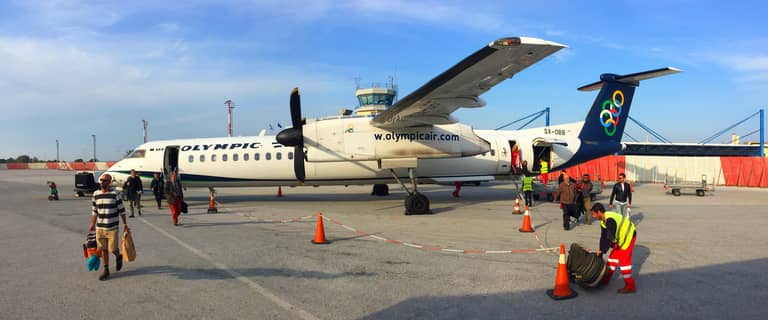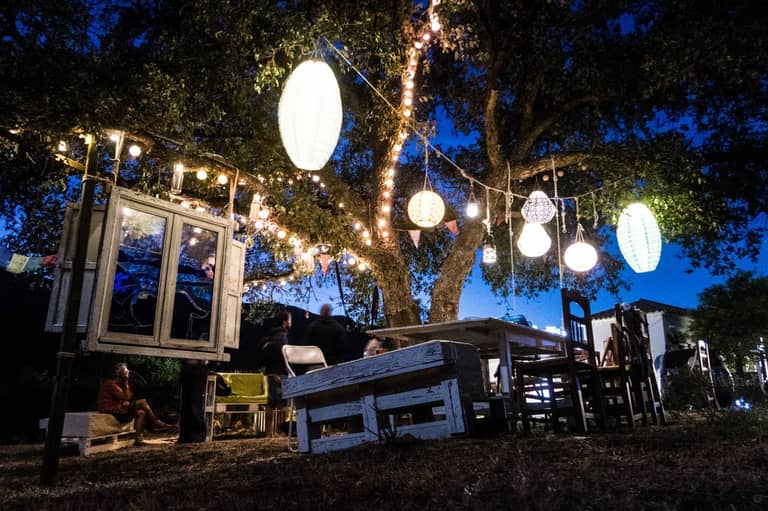Starting out on your first journey you don’t think you’re allowed to call yourself a digital nomad yet. Later you use in quotes because you can’t identify 100% with it. But thanks to becoming main stream it’s the easiest way of explaining the lifestyle.
I’ve been meaning to write down some notes on how I do it for anyone interested. I’ll update this post when something new pops up or changes.
For context, I try to spend 9+ months of the year away from my homebase Vienna where I spend the summer months. I try to spend at least a month in new places. This gives me time to overcome being a tourist and experience a bit more like a local.
I’ve split the notes into different areas and hope you find them useful.
Co-Working
“Are you going on holiday, again?” has become quite common. Even friends who know better after I explained it still say this phrase. The gist of it is that from Monday to Friday (sometimes even more #entrepreneur) I still need to work.
I travel with my work equipment (see below) so all I need is electricity and an internet connection. Sometimes I can even do without the latter for a couple of hours if I have to.
I’ve worked from my accommodation in the past and while that’s possible I prefer the atmosphere of a co-working office. You rent a desk for a certain period of time and work along side various people. Freelancers, entrepreneurs, teams and of course other digital nomads. It’s a nice way to meet people fast, but don’t fall into the trap of socializing too much. You are there to work after all. Usually there are social events, meetups in the big spaces - that’s where you’ll get to know everyone. But this changes from space to space.
Things to look out for with a co-working space:
- Figure out how good their internet is before committing to a long period. Usually you can buy a day pass and give the space and it’s internet a test run. Unfortunately you can still test on a good day and then it turns out Skype calls are near impossible on other days.
- Bring headphones. People will be conducting calls next to you. But also be respectful of others working around you when you are calling yourself.
Work Equipment
I try to travel as light as possible. The following setup allows be to very productive and still doesn’t take up much space.
My main PC is a Lenovo ThinkPad - durable, fast and stable. Data synced to DropBox and a second external hard disk. My main phone is an iPhone (but it may be my last due to the changes made in the last 2 generations).
The other peripherals I travel with:
- Roost stand: light weight and props up the laptop to eye height
- Logitech K380 keyboard: Durable Bluetooth keyboard with long battery life. I used the K810 for a year. Then it got bent in my backpack. It costs a lot more and I don’t see the benefit compares to the K380.
- Microsoft Sculpt Comfort Mouse Black: I’ve always liked Microsoft mice and this is the best on at the moment. Only downside is the blue windows key on the left which has an annoying vibration motor that I can’t seem to switch off.
- Creative Aurvana Live! headphones: I’ve had these for years, they can be worn for hours, and sound quality is great.
- Bose QuietComfort 20 Acoustic Noise Cancelling headphones: great for flying and my primary headset for voice calls
- Huawei Mobile Wifi E5730: combined mobile wifi router for prepaid SIMs in countries I visit, but also a battery pack.
Accommodation

With AirBnB, VRBO and even booking.com access to short to mid-term rentals has never been easier. Prices vary based on location, standard and season. Especially tourist high seasons (summer) can get expensive quickly as hot spots are discovered by more people.
One way to reduce your accomodation costs is to do co-living. Depending on your country of origin flat mates may be something students do save costs or just a way of life in big cities because rent is so high.
I mix my accomodations between co-living and private flats. Sometimes you just want to spend the extra to have something for yourself for a month. By choosing off-season months to do this, you can save money on-season by sharing.
If you’re new to a place there’s the added advantage of knowing people right from the get go. For new locations I will usually get a (private) room with locals. For places I come back to again and again and know the area I have rented larger places to sublet rooms to other nomads.
But beware that co-living arrangement require a certain level of flexibility. You never know who you’re going to spend weeks with and if you’re too uptight you’re not going to like it. I’ve lived with different personalities, ages and numbers. Some months were smoother, others required some adapting. All in all I don’t regret any of my co-living mates.
Recently I’ve become aware of some short term young professional (i.e. serviced) flats, such as Fizz available in Amsterdam, Germany and Austria. I have yet to try them.
Travel

There’s a lot of information on the internet on how to find cheap flights, but let me add one tip to the mix: Scott’s cheap flight email list. Sign-up with departure airports and places you’re interested in. Scott and his team will send you great deals and the odd mistake faire. Well worth the 25 USD per year.
For long distance I tend to go for red-eye (overnight) flights. I use a TravelRest neck pillow which doubles nicely as a neck warmer when the airplane air is cold.
Of course there’s a question of my inspiration. How do I decide where to go? There’s no single answer here. I’m bound to land in Tarifa, Spain once a year at least. That’s where I started my nomad journey. I know the town by heart almost and lot’s of people I know.
For all the other destination it often comes down to coinscidences. I have to admit a lot of Vloggers influence my destinations. Take my next trip for example. I never wanted to go to China until I realized Shenzen - yes, the electronics mecca - has a green residential side to it. It’s only thanks to YouTubers giving direct insight to these places that I discover them and put them on my “list”.
Activities with others / Meeting people

“Aren’t you lonely when you travel by yourself?” Another one of those common phrases. Actually quite the opposite. I’m usually more in search of me time (ISTJ). Boredom and loneliness is not something I’m familiar with. Co-Working and Co-Living usually gets you a group of local and fellow travellers. Apart from that give CouchSurfing a try. Not to surf or host - which is still a nice option though. But there’s a little know feature where you can post a hangout. You say what you’d like to do and wait for people to get in touch. Or you can actively see what others want to do and say hello.
Also there are often Facebook groups for each country and possibly even city depending ont the size. Just search for “digital nomad” + city and they should popup. Don’t be scared to post that you’ve just arrived and want to do something. Or search the group for some tips on what to do.
Safety Tips
Often a location is not as bad as the media seems to portrait. But it’s wise to be street smart when travelling.
Travel with a prepaid credit card and one other. The prepaid is on me in my wallet and the other stays locked up in my accomodation or somewhere safe. If your credit card gets stolen, you not only have a backup, but the theft is limited to what you have on your prepaid. N26, Holvi and Revolut are great digital banks. They offer a prepaid card with full cost control via an app.
Stay informed of the security situation where you are staying. Get tips from locals on what to do and what not to do. If in doubt take an Uber. Especially at night.
But after saying all that. Don’t be paranoid. I believe humans are good natured by default. It’s only a small percentage that mean you harm.
Miscellaneous Tips
Get a sense of opening times and public holidays. I’ve been caught out by this one time and time again - even at home. Keep an eye out for public holidays in the country you’re in which are not the same as at home (or your place of employment). You might just get stuck in front of a closed co-working space.
If using Uber or a similar service, find out not only if they will take you where you want to go, but can you get one for your return trip to.
Get a local SIM card at the airport when you arrive. Not only will they speak your language. They will also be well equipped to help you activate your card. Some providers require an address, ID-card or some package activation steps. Spend the extra half an hour to get it sorted out. Have a look at virtual phone providers (some incl. call forwarding services) like VirtualPhone or Sonetel if you need it for business (see freshVanRoot’s guide on Sonetel).
I recommend taking either a CitySightseeing (yes those tourist buses) bus or a free walking tour (based on tips) as soon as you arrive. For me it’s proven to be the fastest way to get an overview of a new place.
Miscellaneous Links
Some of these links only apply to people with Austrian homebases. But maybe they can be inspiration to look for something similar in your home country.
LivePost is an Austrian service that let’s you send letters to them as a PDF. They will then print and send them by post to an address. I’ve had to use them on and off for sending invoices or official documents. A similar service in the UK is DocMail.

Any other tips and tricks you have that might be interesting to put on this list? Send me a message using the contact link.